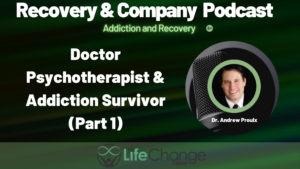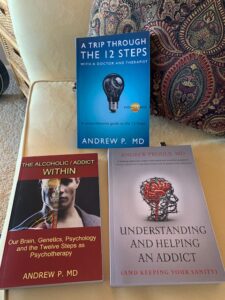If you listened to the last 2 episodes of the Recovery and Company podcast you heard Dr. Andrew Proulx’s powerful story of overcoming opioid addiction. It begins like many others with a difficult life transition followed by painful emotions… and an opioid prescription for pain.  In Dr. Andrew’s case, he was going through a messy divorce which led to anger and bitterness. Pain from a dental issue is what negated the opioid prescription. After that he spiraled downward quickly. In a short amount of time, Dr. Andrew went from being a psychotherapist and prominent ER doctor to becoming homeless and having his medical license suspended. He also shared how ease of access to opioids and other holes in the system made it relatively easy for him to acquire the drugs. In addition to the emotional challenges he was facing; Dr. Andrew also had what he calls an addicted brain:
In Dr. Andrew’s case, he was going through a messy divorce which led to anger and bitterness. Pain from a dental issue is what negated the opioid prescription. After that he spiraled downward quickly. In a short amount of time, Dr. Andrew went from being a psychotherapist and prominent ER doctor to becoming homeless and having his medical license suspended. He also shared how ease of access to opioids and other holes in the system made it relatively easy for him to acquire the drugs. In addition to the emotional challenges he was facing; Dr. Andrew also had what he calls an addicted brain:
“There really is such thing as the addicted brain, it’s not a myth. Over the past 10 years we’ve developed new brain imaging technology that allows us to see what’s happening in the brain in real time and we’ve seen that there are fundamental changes that occur in the brain of genetically susceptible people.”
Rough estimates tell us that about 10 percent of people who are prescribed opioids for pain become addicted. Many of these individuals transition to heroin. According to Dr. Andrew, 92 percent who are addicted to heroin started out on prescription opioids.
The good news is that just because a person has an addicted brain, or a genetic predisposition to developing an addiction, does not mean they have to accept their fate, as Dr. Andrew realized. While millions of people become addicted, millions of people can and do recover from addiction.
Unfortunately what can happen is the downward spiral of addiction and isolation causes many people to feel like their situation is unique or that they are hopeless and no one can help them. Through recovery they realize this is simply not true. However, people who find themselves in an addiction (particularly those with a genetic predisposition) must come to the realization that if they want to recovery, most likely they cannot do it on their own. In the podcast, Dr. Andrew shares a deeply personal story about how he was planning his own suicide when some friends showed up and took him to recovery. It was in treatment that he had a lightbulb moment:
“I realized, oh my God, I’m nothing special here. I’m not unusual. I’m not different from anyone else. I’m just the same as the millions of other addicts and alcoholics who came before me. They were just as addicted… just as messed up. Their lives were just as much a train wreck as mine and many of them more. Look at all these guys, they beat it ya know. A little light bulb went off in my head and that was the first time I realized that I can do this, there is a way. There are millions of people who can do this and I can too. What a difference! I went from being a dead man walking, someone who accepted his own death, to someone who had hope.”
 Today, Dr. Andrew has been sober over eight years and is a best-selling author of several books:
Today, Dr. Andrew has been sober over eight years and is a best-selling author of several books:
The Alcoholic / Addict Within: Our Brain, Genetics, Psychology and the Twelve Steps as Psychotherapy
Understanding and Helping an Addict (and keeping your sanity)
A Trip Through the 12 Steps: With a Doctor and Therapist
For anyone struggling with an addiction, Dr. Andrew has this advice:
“What holds people back is self-efficacy, the belief that they can do it. People think they are too addicted or that they are too far gone, and I’m here to tell you every body, every single person, I repeat everybody, has the ability to beat addition and enjoy a full and permanent abstinent recovery without exception, everybody can do that!”
